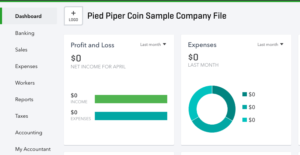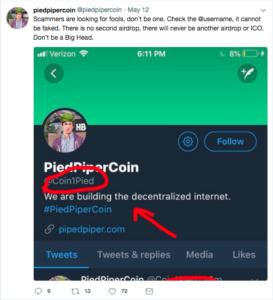This past week on The Henry Raines Show, I talked about airdrops. I have been contemplating what token projects to use as an example for my blog and assisting colleagues interested in learning more about cryptocurrencies, coins, or tokens. I needed a “Rock Castle Construction,” (the iconic QuickBooks® sample company file).
Silicon Valley, a show airing on HBO, recently aired episodes surrounding Initial Coin Offerings (ICOs). Shortly after, a clever, well-versed in both the show and the cryptocurrency space, personality appeared on twitter as @PiedPiperCoin.
In less than six days, this handle managed to produce a wealth of humorous tweets and material, as well as developing an ERC-20 token and distributing it through an airdrop.
I consider myself a connoisseur of low-end whitepapers and tokens. What this handle has managed to assemble in such a short period of time is remarkable. It is the perfect hypothetical (I’ll reiterate it several times … it is a meme, satire, I do not recommend buying, selling, trading or doing anything other than enjoying the show). @PiedPiperCoin ($PPI) has constructed a far more transparent project than many of what I have seen. No funds were solicited, and $PPI has provided transparent, timely, relevant data for me to use as examples for many posts and lessons.
What exactly is an airdrop? They typically are the disbursement of native tokens (for future or current use on a platform/project). Many refer to them as “free,” I prefer to liken them to a coupon. They can be provided as the result of a fork, a bounty, holding a particular currency or wallet, or being on an exchange. I’ll address forks and possible accounting implications for the ICO in future posts. With social media and larger technology companies banning advertising of ICOs, an AirDrop is an alternative method of creating awareness for the token and project by distributing the native token to potential users.
The first airdrop utilized what I consider a set of best practices as a consumer signing up for an airdrop. Most ICOs will ask you to register for an airdrop, providing the Ethereum public address to send the tokens.
- Protect your private keys. – $PPI asked for your public, Ethereum Address and provided instructions on how to sign up for the two primary ERC-20 token wallets. MyEtherWallet.com (and MetaMask) provides a detailed safety tutorial on the difference between public and private keys.
- Use caution when downloading native wallets of smaller projects – ($PPI) does not have a separate wallet nor a website requiring registration.
- Do not click on redirect links to wallets – $PPI gives explicit instructions on how to be certain you are at the correct website with SSL certificates and “Secure” is noted in your browser.
- Do not send cryptocurrencies in exchange for the airdrop – The $PPI did not ask you to send ETH in exchange for $PPI.
- Beware of scams and hijacked accounts – someone is already scamming the satire!
- Do not share personally identifiable information (social security numbers, government issued id’s, banking information, etc.) $PPI asked for a few, basic public identifiers and references to the show. (Public Ethereum Address, twitter handle, a link to a tweet about the airdrop, and a couple of TV show references in a Google Doc)
After the airdrop completed, $PPI published a post on how to check for your tokens and an additional post covering the history and possible future of the project. I am happy to see in this update that $PPI is going to take some time to focus on the project and building out the team (I can barely keep up, I’ve had to put my cat to work).
$PPI is offering an additional type of airdrop, a social bounty.
I am looking forward to blogging about the additional events and accounting for the transparent smart contract in the days ahead.
This blog post is for informational purposes only. Nothing herein shall be construed as financial or legal advice.




